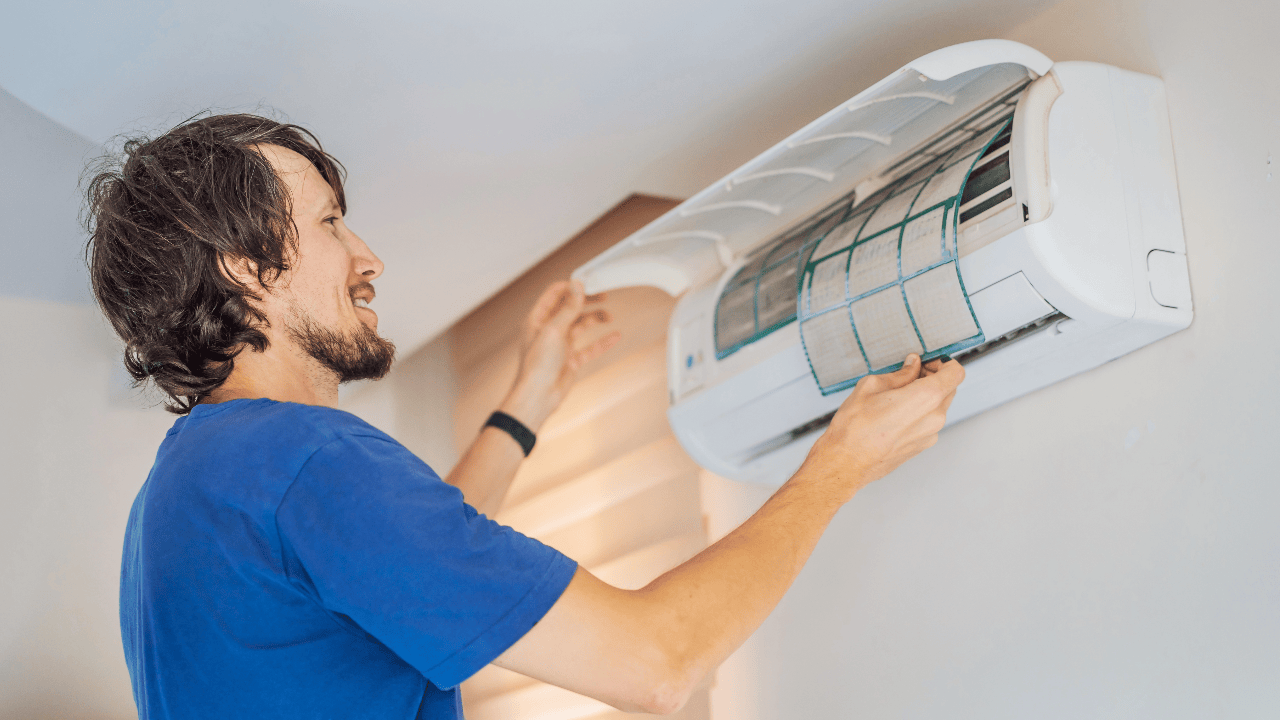
As the sun intensifies and the days grow warmer, the importance of a reliable air conditioner becomes unmistakably clear. Regular air conditioner maintenance isn't just a suggestion—it's a necessity to ensure the longevity and efficiency of your cooling system. Ignoring the health of your air conditioning unit can lead to increased energy costs, reduced system efficiency, and the dreaded breakdown during the peak of the cooling season.
A well-maintained AC unit does more than just keep you cool; it becomes a guardian of your comfort and a defender against the sweltering heat. From the air filter to the condenser coil, each component plays a vital role in delivering that refreshing cool air. Proper AC maintenance not only extends the life of your air conditioning system but also ensures it operates at peak performance, saving you money and keeping your home a serene, cool haven.
Remember, regular maintenance is not just about responding to problems—it's about preventing them. Embrace the art of air conditioner upkeep and join us on a journey to discover the key steps to keep your unit running smoothly. Let's dive into the world of AC maintenance, where every effort you make contributes to a cooler, more comfortable home.
Join our newsletter
Stay on top of the latest in landscaping and lawn care with one valuable tip right in your inbox every Saturday morning.
1. Inspecting and Replacing the Air Filter
A pivotal step in air conditioner maintenance is the regular inspection and replacement of the air filter. This seemingly small component has a massive impact on the efficiency and health of your AC unit. A clean air filter ensures optimal airflow, preventing your system from overworking and reducing wear on critical components like the evaporator coil.
Here's a step-by-step guide to ensure your air filters are in top condition:
- Locate the Filter: Typically found in the return air duct or blower compartment. Your AC system manual can guide you if you're unsure.
- Examine the Filter: Check for dust, dirt, and signs of wear. If it's visibly dirty or has been in use for over three months, it's time for a change.
- Select the Right Filter: Ensure you choose the correct size and type for your air conditioning unit. Compatibility is key for optimal performance.
- Replace the Filter: Carefully remove the old filter and insert the new one, ensuring it fits snugly without any gaps.
- Regular Checks: Make it a habit to inspect your air filter every month, especially during high usage periods.
By keeping your air filters clean, you not only enhance the efficiency of your air conditioner but also contribute to a healthier indoor air quality. Remember, a little attention goes a long way in AC maintenance!
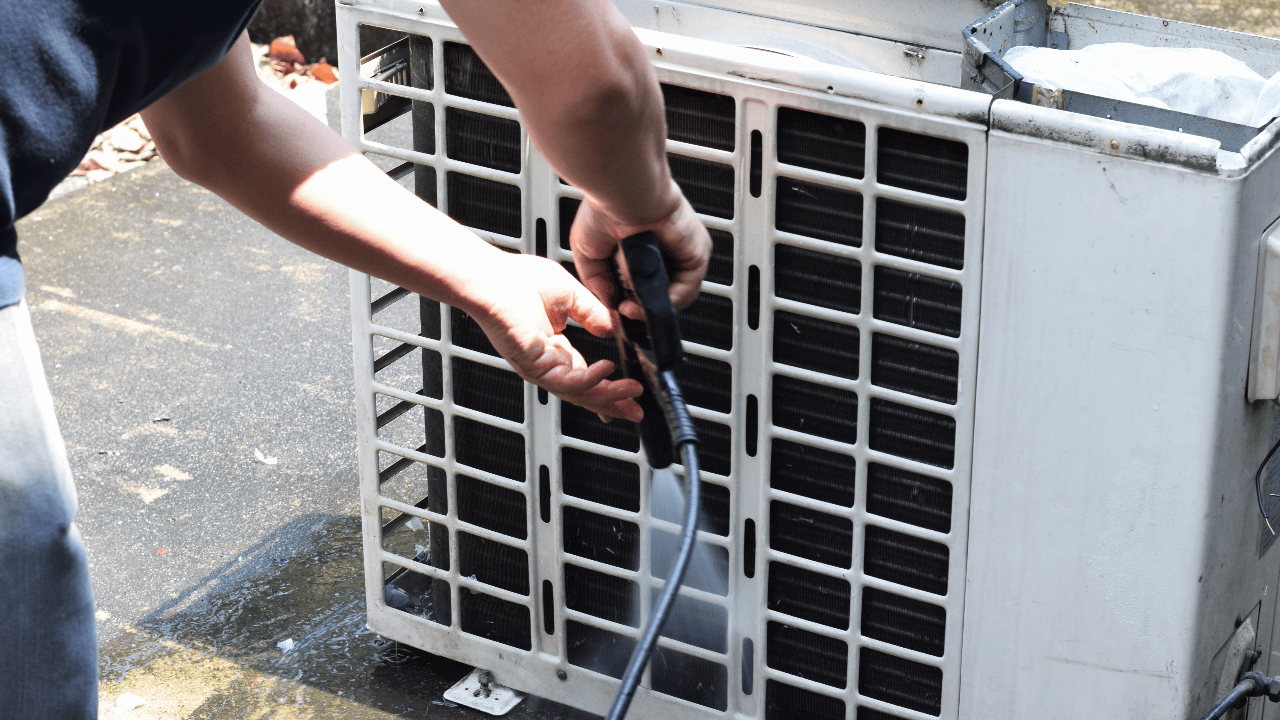
2. Cleaning the Outdoor Unit Regularly
The outdoor unit of your air conditioner, often overlooked, is a cornerstone of your home's cooling system. It houses the condenser coil and compressor, crucial for expelling heat from your home. Keeping this unit clean is essential for maintaining your AC's efficiency and longevity.
Follow these tips for safe and effective cleaning:
- Power Off: Ensure the unit is turned off at the breaker box for safety.
- Clear Debris: Remove leaves, dirt, and other debris around the unit. This prevents blockages and allows for better airflow.
- Clean the Fins: Gently brush the fins with a soft brush to remove accumulated dirt. Be careful as fins are delicate and can easily bend.
- Hose Down: Use a garden hose to gently rinse the fins. Avoid using a pressure washer as it can damage the fins.
- Check Inside: Inspect the area around the condenser coil for any obstructions or excessive dirt.
- Professional Inspection: While DIY cleaning is beneficial, having a professional check your outdoor unit annually ensures deeper issues are not missed.
Regular cleaning of your outdoor unit not only boosts system efficiency but also helps you avoid costly repairs, ensuring your air conditioning unit runs smoothly throughout the hot air season.
3. Checking Refrigerant Levels
Refrigerant is the lifeblood of your air conditioning system, playing a critical role in cooling your home. It absorbs hot air from inside and expels it outdoors, a key process in your AC unit. However, incorrect refrigerant levels can impair your system's efficiency, leading to higher energy costs and reduced cooling performance.
To maintain optimal refrigerant levels:
- Visual Inspection: Check for signs of refrigerant leaks, such as oil stains around AC connections or icy build-up on the evaporator coil.
- Gauge Check: Use a refrigerant gauge to measure the current level. This is best done by a professional, as handling refrigerant requires expertise and special tools.
- Professional Service: If you suspect a leak or imbalance, schedule a service call. Handling refrigerant can be dangerous and is best left to trained technicians.
Ensuring your AC system has the right amount of refrigerant not only boosts efficiency but also extends the lifespan of your unit. Regular checks are a crucial aspect of air conditioner maintenance, keeping your home comfortably cool and your system running smoothly.
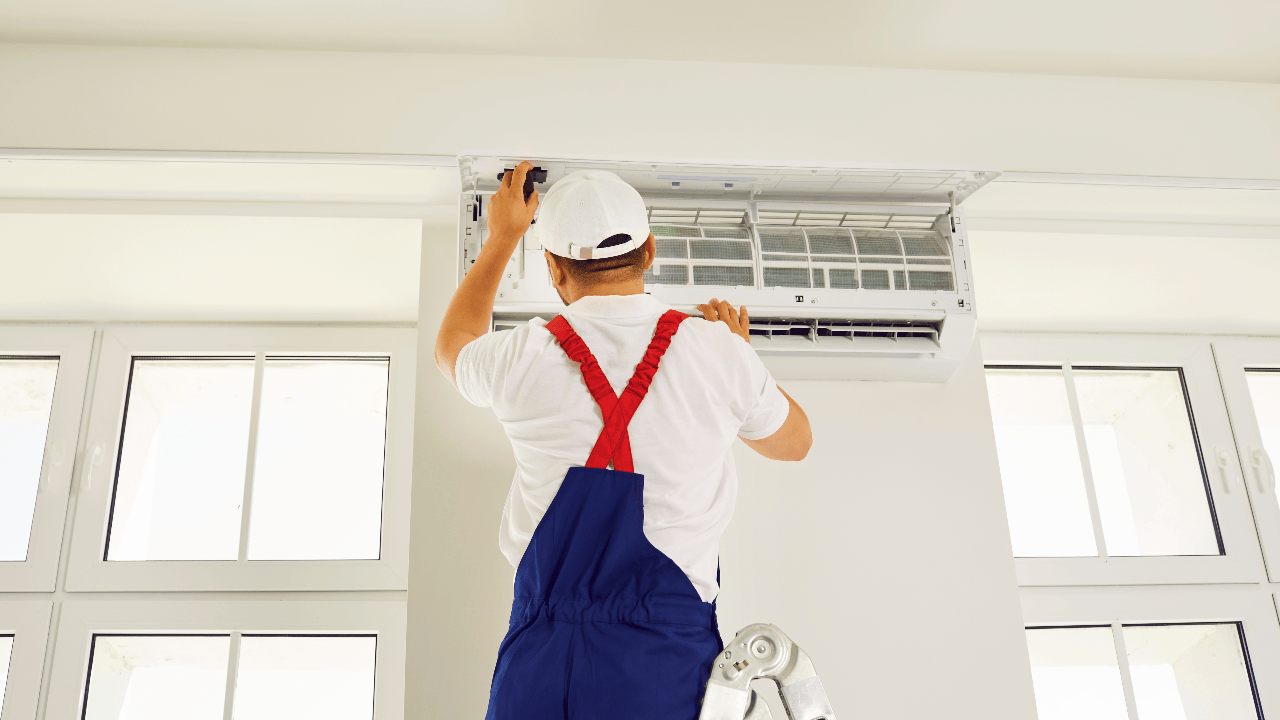
4. Ensuring Proper Airflow
Proper airflow is essential for your air conditioner to function efficiently. It ensures that cool air circulates effectively throughout your home and prevents the unit from overworking, which can lead to wear and tear on components like the compressor and evaporator coil.
To maintain good airflow:
- Keep Vents Clear: Ensure all air vents in your home are unblocked by furniture or curtains to allow free movement of air.
- Clean Around the Unit: Regularly remove debris and leaves from around the outdoor unit to prevent blockages.
- Ductwork Inspection: Have a professional inspect and clean the ductwork periodically to ensure there are no leaks or blockages affecting airflow.
Good airflow is key to maximizing the efficiency of your AC system, ensuring your home stays comfortably cool while keeping energy consumption in check.
5. Regularly Inspecting Evaporator and Condenser Coils
The evaporator and condenser coils in your AC unit play a critical role in the cooling process. The evaporator coil absorbs heat from indoor air, while the condenser coil releases it outside. Over time, these coils can accumulate dirt and debris, leading to reduced efficiency and higher energy costs.
Here's how to keep these vital components in top shape:
- Visual Inspection: Regularly check both coils for signs of dirt or corrosion.
- Gentle Cleaning: Use a soft brush or a special coil cleaner to gently clean the coils. Be careful not to bend the delicate fins.
- Professional Maintenance: For a thorough cleaning and inspection, especially if you notice signs of damage, contact a professional. They can also check for refrigerant leaks and other issues.
Proper maintenance of the evaporator and condenser coils is crucial for the effective operation of your air conditioning system. Keeping them clean ensures optimal performance and longevity of your AC unit.
Join our newsletter
Stay ahead of the curve in all things outdoor.
Get the inside scoop on the latest landscaping, lawn care, and fencing trends with 1 actionable tip every Saturday morning.
6. Checking Thermostat Settings
Correct thermostat settings are vital for maximizing the efficiency of your air conditioning system. A well-set thermostat ensures your AC unit maintains the desired temperature without overworking, saving on energy costs and reducing wear on components like the compressor and evaporator coil.
To optimize your thermostat:
- Set a Comfortable Temperature: Find a temperature that balances comfort with efficiency. Typically, 78°F is recommended when you're at home.
- Use a Programmable Thermostat: Programmable thermostats can automatically adjust the temperature based on your schedule, increasing efficiency.
- Avoid Extreme Temperature Changes: Large swings in setting can cause your AC system to work harder, decreasing system efficiency.
- Regular Checks: Ensure your thermostat is functioning correctly and isn't affected by external factors like direct sunlight or drafts.
Properly managing your thermostat settings is a simple yet effective part of air conditioner maintenance, ensuring your system runs efficiently while keeping your home comfortably cool.
7. Examining Electrical Connections and Controls
Regular inspection of electrical connections and controls is crucial for the safety and efficiency of your air conditioning unit. Loose or faulty connections can lead to inefficient operation and even pose a safety hazard.
To ensure proper electrical maintenance:
- Inspect Wiring: Check for any signs of wear, fraying, or corrosion on the wires.
- Tighten Connections: Ensure all electrical connections are tight and secure.
- Test Controls: Verify that the thermostat and other controls are working correctly and responding as they should.
- Professional Assistance: Consider having a professional electrician or HVAC technician inspect your system annually to ensure everything is in safe working order.
Maintaining the electrical aspects of your AC system not only ensures it operates at peak efficiency but also helps prevent potential electrical hazards in your home.
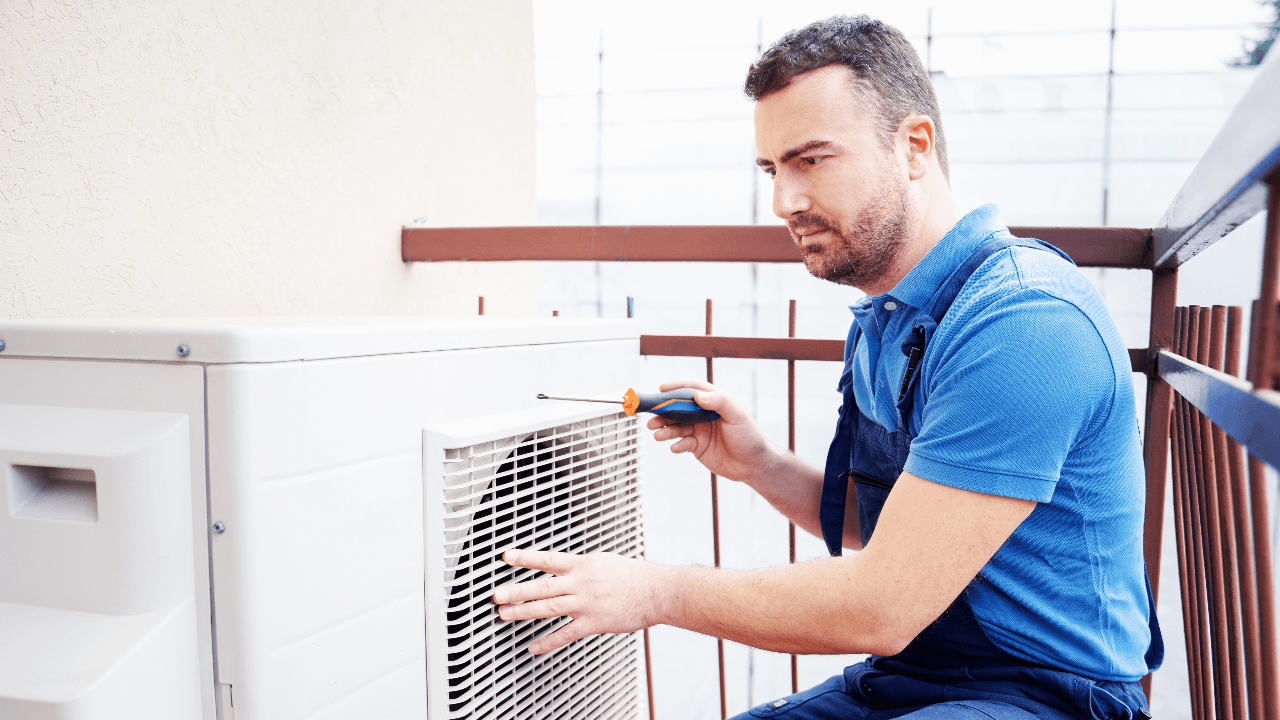
8. Clearing Drain Lines and Pans
Keeping the drain lines and pans of your air conditioning unit clear is essential to prevent water damage and maintain system efficiency. Clogged drains can cause water backups, leading to potential damage and reduced cooling efficiency.
To clean and clear these components:
- Locate the Drain Line: Usually found near the indoor cooling coil mounted above the furnace in the basement.
- Flush the Line: Use a cup of vinegar or bleach to flush the line and prevent algae and mold growth.
- Check the Drain Pan: Ensure the pan is not full or overflowing. Clean it with soap and water if necessary.
- Annual Inspection: Have a professional inspect these components annually, especially before the high-usage summer months.
Regular maintenance of the drain lines and pans is a vital part of air conditioner upkeep, ensuring your system runs smoothly and your home stays protected from water-related issues.
9. Scheduling Professional Maintenance
While DIY air conditioner maintenance is beneficial, scheduling regular professional maintenance ensures your AC unit operates at peak efficiency and longevity. Professional technicians can detect and fix issues that might be unnoticed in routine self-checks.
Benefits of professional AC services include:
- Expertise: Technicians have the skills to thoroughly inspect and service all components, from the evaporator coil to the condenser unit.
- Preventive Care: Professionals can identify and address minor issues before they escalate into major problems, saving you from costly repairs.
- System Efficiency: Regular professional maintenance keeps your air conditioning system running efficiently, reducing energy costs and improving cooling performance.
When to seek professional AC services:
- Annual Check-Up: Schedule a comprehensive inspection and maintenance service at least once a year, ideally before the high-demand cooling season.
- Performance Issues: If you notice any irregularities like strange noises, weak airflow, or inconsistent cooling, it's time to call in the experts.
Investing in professional AC maintenance is a wise decision for the health of your air conditioning unit, ensuring you stay cool and comfortable all season long.
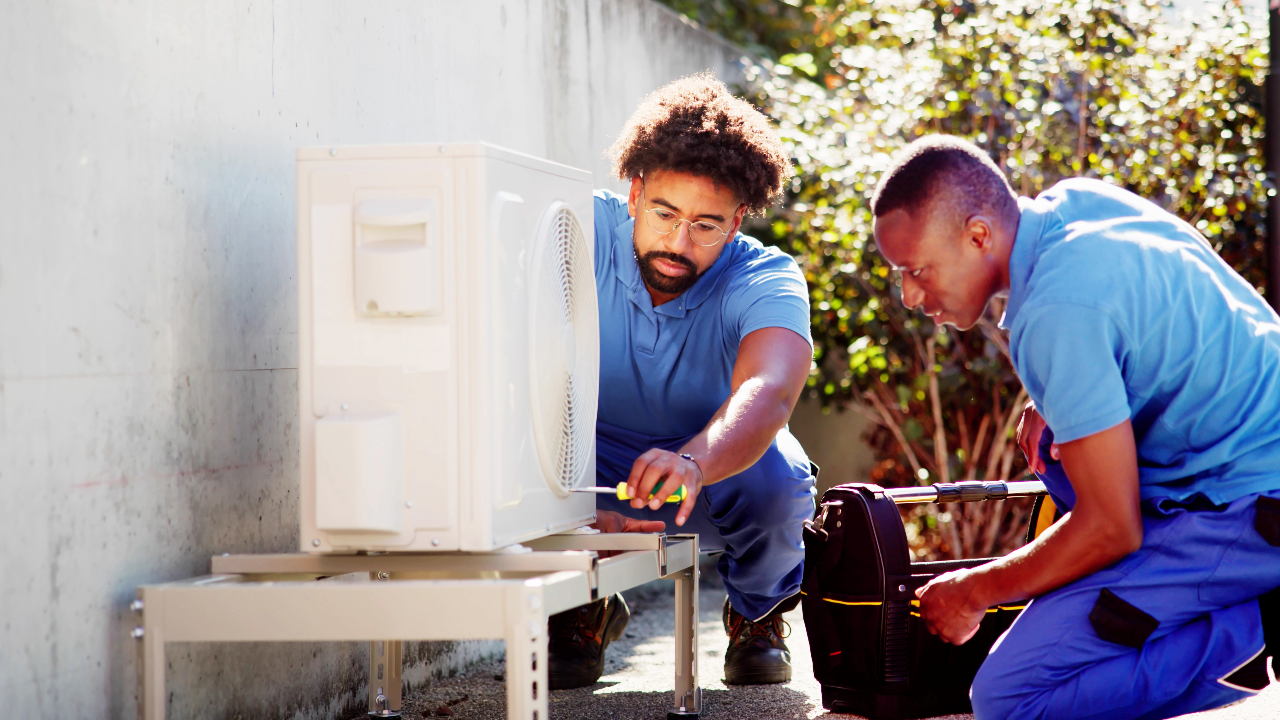
10. Adopting Energy-Saving Habits
Enhancing the efficiency of your air conditioning unit isn't just about maintenance; it's also about adopting energy-saving habits. These practices not only reduce your energy costs but also extend the lifespan of your AC system.
Energy-saving tips include:
- Upgrade to a Programmable Thermostat: Set schedules to reduce AC usage when you're not home.
- Optimize Air Circulation: Use ceiling fans to help distribute cool air more efficiently throughout your house.
- Seal Windows and Doors: Prevent cool air from escaping by ensuring your home is well-insulated.
- Avoid Heat Build-Up During the Day: Use blinds or curtains to keep out sunlight and reduce the workload on your air conditioner.
Implementing these habits contributes significantly to the overall efficiency and effectiveness of your cooling system, making your home more environmentally friendly and comfortable.
Conclusion: Emphasizing the Importance of Regular AC Maintenance
As we wrap up our guide on 10 Essential Air Conditioner Maintenance Tips, it's clear that regular maintenance is the key to a long-lasting and efficient air conditioning unit. Each step, from inspecting the air filter to scheduling professional maintenance, plays a crucial role in ensuring your AC system operates at its best. These practices not only enhance the performance of your air conditioner but also contribute to lower energy bills and a comfortable indoor environment.
Remember, consistent care and attention can prevent the majority of common AC issues. By integrating these maintenance tips into your routine, you can enjoy a cooler home, extend the lifespan of your unit, and avoid unexpected breakdowns. Embrace these essential maintenance steps to ensure your air conditioner remains a reliable ally against the heat, year after year.
Join our newsletter
Stay ahead of the curve in all things outdoor.
Get the inside scoop on the latest landscaping, lawn care, and fencing trends with 1 actionable tip every Saturday morning.